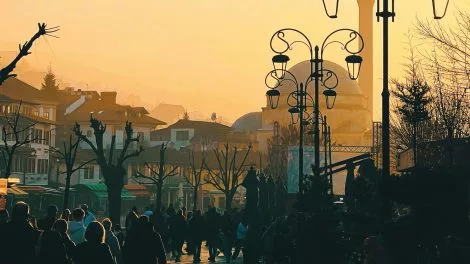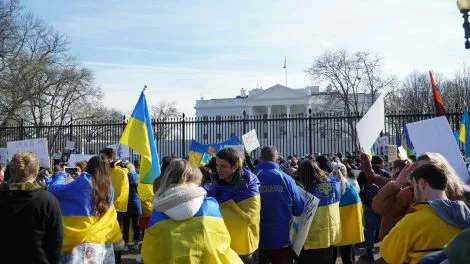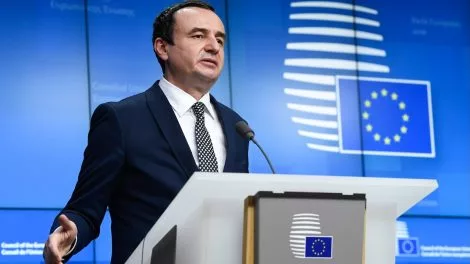Recent events suggest that Russia’s political regime, forced to tackle certain traumatic reforms, has begun to lose focus.
As discussed in a previous report, the social contract, which had been the cornerstone of stability for nearly 20 years, has been broken. President Vladimir Putin’s approval ratings have gone down by a third. The September 9 local elections in 80 out of Russia’s 85 regions have shown not only a general decline in support for United Russia (nominally the country’s ruling party), but several conspicuous defeats; in four regions, runoff elections for governor will be required, which has not happened for quite a while.
The meaning and consequences of these events will soon become clear. But in the meantime, a different plot is developing. This train of events could lead to an opposite result, facilitating a new consolidation of Mr Putin’s Russia and a hardening of its domestic and foreign policies.
The plot concerns not the political but the religious domain. As in all church matters, there is a centuries-long backstory. Its latest twist, however, has very significant political implications. It concerns last month’s apparently final decision by Bartholomew, the Orthodox Patriarch of Constantinople (Istanbul), to set up under his own aegis an Autocephalous Orthodox Church in Ukraine.
Ending subordination
Here some clarification is in order. Ukraine is a predominantly Orthodox country. However, three different Orthodox churches function there. The largest (12,000 parishes), and the only one acknowledged as legitimate by the world’s other canonical Orthodox churches, is formally subordinate (though it is broadly autonomous) to the Moscow Patriarchy.
Even before the current disastrous turn in Russo-Ukrainian relations, this religious subordination was a natural cause of concern for Ukrainian nationalists. Precisely for reasons of nation-building, the Ukrainian Orthodox Church of the Kyiv Patriarchy (5,000 parishes) split away from the “Moscow” church in the 1990s. There is also a Ukrainian Autonomous Orthodox Church (1,200 parishes), founded in 1920. The latter, initially supported but later prohibited by the Bolsheviks, was restored by the Nazi occupation authorities during World War II, before being disbanded again and only restored in 1989, in the same context of a recovering Ukrainian national movement.
For a long time, Patriarch Bartholomew did not react to insistent requests from Ukrainian politicians, including President Petro Poroshenko, to acknowledge the legitimacy of Ukrainian Orthodoxy, independent of Moscow. On September 3, 2018, his position changed. The decision was officially announced, but must still be ratified by a complex internal procedure.
Most likely, the recognition of the Ukrainian church’s independence will not be via direct recognition of the Kyiv Patriarchy or the Ukrainian Autonomous Orthodox Church by Constantinople, but through the creation of a new entity, which will take some time. However, the exarchs (private representatives) of Patriarch Bartholomew, bishops Daniel and Hilarion, responsible for overseeing the whole process, have already been appointed and arrived in Kyiv – from the United States and Canada, respectively.
Painful amputation
Patriarch Kirill of Moscow made desperate efforts to prevent this turn of events, including a last-minute visit to Istanbul to meet with Bartholomew (the revolutionary announcement came three days later). They were a complete failure.
Now the Moscow Patriarchy is indignant, complaining that Bartholomew’s decision is illegitimate because it encroached on Moscow’s “canonical area.” Moscow appealed to the world’s other recognized Orthodox churches (there are 15 of them, and others with unofficial status) to withhold support for this “mean and perfidious project.” Such sensitivity is understandable: out of Russian Orthodoxy’s 36,000 parishes, barely half are in the Russian Federation, including one-third in Ukraine. The latter include many wealthy parishes made up of true believers rather than nominal Christians.
In the long run, everything depends on how these parishes react. Orthodox canonical law is archaic, convoluted, arcane and ambiguous; there is no generally accepted authority to provide a straightforward, authoritative interpretation. On the other hand, the Constantinople Patriarch bears the title of the Supreme Universal Judge, Christianity did come to Russia from Byzantium, and the title of Moscow Patriarch was originally conferred by Constantinople in 1589.
One could theoretically imagine that Bartholomew may be forced to revoke his decision. Opponents will inevitably make hints and threats of that kind. Church hierarchs could also take advantage of this hazy and ambiguous situation for their own opportunistic reasons. But the fate of Orthodoxy in Ukraine will almost certainly be determined by the choices of ordinary Ukrainian believers.
Divided flock
No doubt, Ukrainian Orthodoxy is facing a long period of acute internal conflicts: individual churches and monasteries can be expected to switch sides, perhaps repeatedly; even physical violence cannot be ruled out. There will almost certainly be a ripple effect on the Ukrainian Greek Catholic Church (3,800 parishes); for many of its members, allegiance to Rome is derived from their absolute refusal to accept Moscow. The disappearance of this objection might push some Greek Catholics back into the arms of the “national” church, especially since their religious services conform to the Byzantine rite anyway.
Certainly, a large portion of the faithful will remain with Moscow, and nothing will change in the areas around Luhansk and Donetsk, which are not under Ukraine’s control. However, realistically minded insiders in the Moscow Patriarchy are inclined to pessimism: “Bartholomew will win, Kirill will lose.”
The crucial factor is the rejection of Moscow in all its guises, which is well-established in Ukraine. The Constantinople Patriarchy is perceived as culturally “Western,” and for good reason: in Turkey itself, the church has a tiny number of parishioners, but it controls numerous and important sources of influence overseas, including the financially powerful Greek and Ukrainian diasporas in the US and Canada. Their attitude toward present-day Russia is quite hostile.
The Moscow Patriarch, while head of the largest Orthodox church, is regarded by much of the rest of the Orthodox world as a barbarian upstart, whose elevation to equal status with the heads of ancient patriarchies is a historical misunderstanding. (These posts date back to the 5th century AD, not the 16th.) Coupled with the automatic support of the Ukrainian government and pressure by radical nationalists, who are even less restrained in their methods than the authorities in Kiev, it appears that a split in Ukrainian Orthodoxy and the secession of its larger portion from the Moscow Patriarchy is a done deal.
Liberal nightmare
The situation lends itself to an easy narrative: Ukraine is continuing down the path toward membership in the family of civilized nations, while Russia – and President Putin as its undisputed leader – has suffered another defeat. However, this opinion is ill-considered. For Ukraine, it is not evident that further division of the country and more chaos and violence is a step toward civilization. And for Russia, this seemingly minor humiliation could produce an astounding snowball effect.
One of the biggest obstacles to the fusion of church and state in Russia was that their geographical borders were not coterminous. For Russia’s Westernising liberals (who are mostly anticlerical), the formation of what we might call “Orthodox totalitarianism” is one of their worst nightmares.
Until now, these fears have been mostly fantasy. While relations in Russia between church and state could be described in terms of friendship and partnership, they were certainly not idyllic, and there was almost no mutual influence. It would be impossible to offer a single example of the Russian Orthodox Church pushing through any major political decision or successfully preventing it. On the other hand, it is impossible to name an example of direct or even indirect meddling by the state in church affairs.
The Russian Orthodox Church has cultivated and guarded its transnational character even when the political environment dictated otherwise. Back in 2009, during his first foreign visit (to Ukraine, of course) after being elected to the Patriarchate, Kirill answered a journalist’s question about whether his visit could be construed as a political mission for the Kremlin. Practically grinding his teeth with irritation, Kirill replied: “I am not a Patriarch of the Russian Federation. I am the Patriarch of the Universal Church.”
After the armed conflict between Russia and Georgia in 2008, the Orthodox church of South Ossetia, now split off from Georgia, filed a request to come under Moscow’s authority instead of Tbilisi’s. This request was refused, based on the Moscow Patriarchy’s unwillingness to violate the ancient canonical rights of the Georgian church. Thus, the ecclesiastical arrangements in this conflict zone – unlike its political or economic affairs – remain unchanged from the status quo ante bellum.
In 2014 Patriarch Kirill, contrary to expectations, kept strict silence about the annexation of Crimea. Later, when this was no longer an option, his remarks were quite restrained, especially in contrast with the triumphant pronouncements of Russian officials. The reason for this temperance was, of course, his unwillingness to lose the Moscow Patriarchy’s large Ukrainian flock. Another surprising accent, against the backdrop of raging anti-Western sentiment in Russia, was Kirill’s cordial meeting in 2016 with Pope Francis (the first for the two churches). This event was baffling to many Russian Orthodox believers, who were used to imagining Roman Catholics as archenemies.
Enemies and friends
The loss of Ukraine will radically change the situation. Confining the Russian Orthodox Church almost to the borders of the Russian Federation will undermine its autonomy and push it into the state’s embrace. This would be welcomed by the authorities, who are increasingly running out of legitimacy. Converting Russian Orthodoxy into a mandatory state ideology would no longer be an idle fantasy but the baseline scenario. Enemies of the church will become enemies of the state, and vice versa. The state, still defined by the Constitution as democratic, republican, federative, law-governed and secular, would receive a powerful impulse and pretext to revise all or some of these uncomfortable rules.
Russia already experienced a period of complete religious isolation from 1448 to 1561, when Moscow’s links with both Constantinople and Kyiv were severed. This isolation was not just religious; it was cultural and political as well. The idea of Moscow as the Third Rome was born exactly then and for that very reason. Something similar could happen now. Russian ultra-patriots are already calling Patriarch Bartholomew “a NATO henchman,” while the Moscow Patriarchy announced on September 14 that it would cut off almost all communications (except Eucharistic) with Constantinople, and go even further if need be.
This development would be a tragedy for those inside and outside Russia who still cherish hopes of ending or at least gradually de-escalating the current conflict between Russia and the West. Those who remember the Christian roots of Europe (which were not, in spite of Pope John Paul II’s desperate efforts, mentioned in the European Union’s founding acts, but which did not disappear for that reason) know that they are absolutely the same for the West and for Russia, whichever governments happen to be in power at the moment.
Russia’s religious isolation only plays into the hands of those – both within and outside Russia — who want to see the country as a rogue state or a proud “besieged fortress” defying the West (the two concepts are virtually the same). Their efforts would convert Russia’s current political regime into a much harsher and more powerful version, even if their aim is to rebuff the Kremlin’s autocratic drive and hybrid aggression by isolating Russia. Some of these critics are bent on assaulting liberal democracy, others seemingly wish to defend it. But in the longer term, the effect of each will be to disrupt and stunt the prospect of expanding liberal democracy’s geographical reach, which until recently had seemed so huge.
The alliance of anti-Westernisers in Russia and anti-Russian forces in the West seems unnatural, but it is not. This convergence cannot be openly proclaimed or admitted, but it has de facto established itself. It is based on objective common interests. As a political tool, the image of an enemy is too effective not to be used. Nobody is more useful, necessary or valuable in politics than a bogeyman. “An enemy is a friend,” George Orwell would have said.
The division of Ukrainian Orthodoxy multiplies the number of enemies and deepens animosities in a world that is already dangerous. This will be the main, and probably the only, result of the split.
—
This article was originally posted on GIS Reports Online, founded by HSH Prince Michael of Liechtenstein to provide unbiased, scenario-based geopolitical forecasts to inform their strategic decision-making. It is reproduced here with permission. The views expressed in this opinion editorial are the author’s own and do not necessarily reflect Emerging Europe’s editorial policy.
Published by: emerging-europe.com




